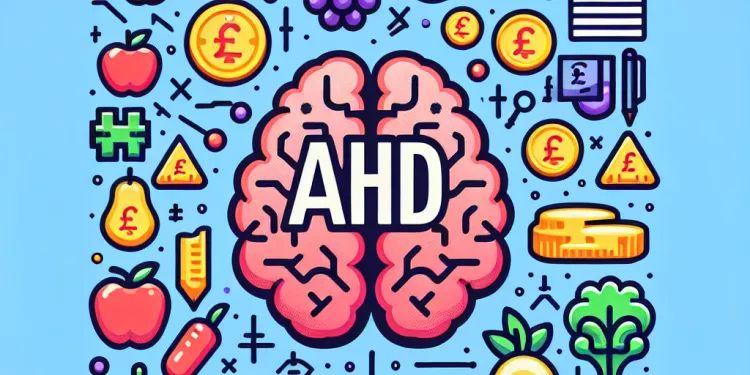
Find Help
More Items From Ergsy search
-

What causes ADHD?
Relevance: 100%
-

What is ADHD?
Relevance: 78%
-

Is there a cure for ADHD?
Relevance: 75%
-

Can ADHD be inherited?
Relevance: 72%
-

Attention deficit hyperactivity disorder (ADHD) - Living with ADHD
Relevance: 71%
-

How is ADHD diagnosed?
Relevance: 71%
-

Can adults have ADHD?
Relevance: 69%
-

Are there different types of ADHD?
Relevance: 69%
-

What are common treatments for ADHD?
Relevance: 69%
-

Attention deficit hyperactivity disorder (ADHD) - Introduction
Relevance: 66%
-

What are the main symptoms of ADHD?
Relevance: 66%
-

What role does the environment play in ADHD?
Relevance: 65%
-

How can I get tested for ADHD?
Relevance: 65%
-

Is ADHD more common in boys or girls?
Relevance: 65%
-

Are there any risks associated with untreated ADHD?
Relevance: 65%
-

Can therapy help individuals with ADHD?
Relevance: 64%
-

Can diet affect ADHD symptoms?
Relevance: 64%
-

How does ADHD affect executive function?
Relevance: 64%
-

Attention deficit hyperactivity disorder (ADHD) - Diagnosis
Relevance: 63%
-

Can lifestyle changes help manage ADHD?
Relevance: 63%
-

Attention deficit hyperactivity disorder (ADHD) - Treatment
Relevance: 62%
-

How can teachers support students with ADHD?
Relevance: 61%
-

What is ADHD?
Relevance: 57%
-

Can ADHD affect academic performance?
Relevance: 48%
-

Causes of a sore throat
Relevance: 31%
-

What causes shingles?
Relevance: 31%
-

What causes hypotony?
Relevance: 31%
-

What causes autism?
Relevance: 31%
-

What causes tinnitus?
Relevance: 31%
-

What causes shingles?
Relevance: 31%
-

BSL - Causes of insomnia
Relevance: 31%
-

What causes appendicitis?
Relevance: 31%
-

What causes asthma?
Relevance: 31%
-

What causes BPH?
Relevance: 31%
-

What can cause autism, if not paracetamol?
Relevance: 31%
-

What causes eczema?
Relevance: 30%
-

What causes thrombosis?
Relevance: 30%
-

What causes obesity?
Relevance: 30%
-

What causes sunburn?
Relevance: 30%
-

What causes SAD?
Relevance: 30%
What is ADHD?
Attention-deficit/hyperactivity disorder (ADHD) is a neurodevelopmental disorder that affects both children and adults. It is characterised by symptoms such as inattentiveness, hyperactivity, and impulsiveness. Understanding the causes of ADHD is essential for managing and treating the condition effectively.
Genetic Factors
Research indicates that genetics play a significant role in the development of ADHD. Studies suggest that the disorder tends to run in families, implying a hereditary component. If a parent has ADHD, there is a higher likelihood that their child will also have the condition. Scientists have identified several genes that may be involved, including those related to the regulation of neurotransmitters such as dopamine. However, the precise genetic mechanisms are still being studied.
Brain Structure and Function
The structure and function of the brain can also contribute to ADHD. Neuroimaging studies have shown that individuals with ADHD may have differences in specific areas of the brain, particularly those involved in attention regulation and impulse control. Areas such as the prefrontal cortex, which is responsible for executive functions, may be smaller or less active in people with ADHD. Additionally, there are often imbalances in the levels of certain neurotransmitters, particularly dopamine and norepinephrine, which are crucial for focus and attention.
Environmental Factors
While genetics and brain structure are significant, environmental factors also play a crucial role in the development of ADHD. Exposure to certain environmental risks during prenatal development, such as smoking, alcohol use, or drug abuse by the mother, can increase the risk of a child developing the disorder. Furthermore, early exposure to environmental toxins like lead or mercury has been linked to ADHD symptoms. Childhood adversity, including severe stress, neglect, or trauma, can also contribute to the development or exacerbation of ADHD symptoms.
Diet and Lifestyle
There's ongoing debate about the impact of diet and lifestyle on ADHD. Some studies suggest that certain dietary components, such as artificial food colourings, preservatives, and high sugar intake, might aggravate ADHD symptoms, although concrete evidence is limited. Additionally, lifestyle factors such as inadequate sleep and sedentary habits might influence the manifestation and severity of ADHD symptoms, highlighting the importance of a balanced lifestyle.
Conclusion
ADHD is a complex disorder with no single cause. It likely arises from a combination of genetic, neurological, environmental, and lifestyle factors. Understanding these causes can aid in better diagnosis and management of the condition, helping individuals lead more balanced and productive lives. Ongoing research continues to shed light on the intricate interplay of factors that contribute to ADHD, promising improved strategies for treatment and support.
Frequently Asked Questions
What is ADHD?
ADHD stands for Attention Deficit Hyperactivity Disorder, a neurodevelopmental disorder characterized by symptoms of inattention, hyperactivity, and impulsivity.
What are the primary causes of ADHD?
The exact cause of ADHD is unknown, but it is believed to involve genetic, environmental, and neurological factors.
How do genetics influence ADHD?
ADHD often runs in families, indicating a strong genetic component. Specific genes related to the regulation of neurotransmitters like dopamine may be involved.
Can environmental factors contribute to ADHD?
Yes, factors such as exposure to lead, prenatal exposure to alcohol or tobacco, and premature birth have been associated with an increased risk of ADHD.
Is there a link between brain structure and ADHD?
Differences in certain brain structures, such as reduced volume in certain areas and alterations in the brain's neurotransmitter systems, have been observed in individuals with ADHD.
Can diet and nutrition affect ADHD?
There is some evidence suggesting that certain dietary factors, such as food additives and sugar, may influence ADHD symptoms in some people.
How does dopamine relate to ADHD?
Dopamine, a neurotransmitter, plays a key role in attention and motivation. Dysregulation in dopamine pathways has been implicated in the development of ADHD.
Can ADHD be caused by parenting styles?
Parenting styles do not cause ADHD, but supportive and consistent parenting may help manage symptoms more effectively.
Are there any prenatal risk factors for ADHD?
Yes, maternal smoking, alcohol consumption, and stress during pregnancy have been identified as risk factors for developing ADHD.
Can brain injuries lead to ADHD?
In some cases, traumatic brain injuries, especially those affecting the frontal lobe, can lead to symptoms similar to those of ADHD.
Is there a link between ADHD and prematurity?
Premature birth, as well as very low birth weight, has been associated with an increased risk of developing ADHD.
How do chemical imbalances affect ADHD?
Chemical imbalances, particularly involving neurotransmitters like dopamine and norepinephrine, are believed to play a significant role in ADHD.
Can stress during childhood cause ADHD?
Chronic stress and exposure to stressful environments during early childhood can exacerbate symptoms but are not direct causes of ADHD.
Are there developmental disorders linked with ADHD?
ADHD often co-occurs with other developmental disorders such as learning disabilities, autism spectrum disorder, and anxiety.
Can exposure to toxins cause ADHD?
Exposure to environmental toxins like lead has been associated with an increased risk of ADHD symptoms.
Is there a connection between smoking and ADHD in children?
Maternal smoking during pregnancy has been linked to a higher likelihood of ADHD in children.
Does ADHD have a hereditary component?
ADHD is highly heritable, with genetics accounting for a significant portion of the risk for developing the disorder.
Can ADHD be caused by an infection during infancy?
Severe infections that affect the brain, such as meningitis, may contribute to symptoms of ADHD, although such cases are relatively rare.
How significant is the role of family history in ADHD?
Family history is a strong indicator, as having a parent or sibling with ADHD increases the risk of developing the disorder.
What impact does sugar consumption have on ADHD?
While some studies suggest a link between sugar consumption and increased activity levels in some children, the evidence is inconsistent and not definitive in causing ADHD.
Useful Links
This website offers general information and is not a substitute for professional advice.
Always seek guidance from qualified professionals.
If you have any medical concerns or need urgent help, contact a healthcare professional or emergency services immediately.
Some of this content was generated with AI assistance. We’ve done our best to keep it accurate, helpful, and human-friendly.
- Ergsy carfully checks the information in the videos we provide here.
- Videos shown by Youtube after a video has completed, have NOT been reviewed by ERGSY.
- To view, click the arrow in centre of video.
- Most of the videos you find here will have subtitles and/or closed captions available.
- You may need to turn these on, and choose your preferred language.
- Go to the video you'd like to watch.
- If closed captions (CC) are available, settings will be visible on the bottom right of the video player.
- To turn on Captions, click settings .
- To turn off Captions, click settings again.
More Items From Ergsy search
-

What causes ADHD?
Relevance: 100%
-

What is ADHD?
Relevance: 78%
-

Is there a cure for ADHD?
Relevance: 75%
-

Can ADHD be inherited?
Relevance: 72%
-

Attention deficit hyperactivity disorder (ADHD) - Living with ADHD
Relevance: 71%
-

How is ADHD diagnosed?
Relevance: 71%
-

Can adults have ADHD?
Relevance: 69%
-

Are there different types of ADHD?
Relevance: 69%
-

What are common treatments for ADHD?
Relevance: 69%
-

Attention deficit hyperactivity disorder (ADHD) - Introduction
Relevance: 66%
-

What are the main symptoms of ADHD?
Relevance: 66%
-

What role does the environment play in ADHD?
Relevance: 65%
-

How can I get tested for ADHD?
Relevance: 65%
-

Is ADHD more common in boys or girls?
Relevance: 65%
-

Are there any risks associated with untreated ADHD?
Relevance: 65%
-

Can therapy help individuals with ADHD?
Relevance: 64%
-

Can diet affect ADHD symptoms?
Relevance: 64%
-

How does ADHD affect executive function?
Relevance: 64%
-

Attention deficit hyperactivity disorder (ADHD) - Diagnosis
Relevance: 63%
-

Can lifestyle changes help manage ADHD?
Relevance: 63%
-

Attention deficit hyperactivity disorder (ADHD) - Treatment
Relevance: 62%
-

How can teachers support students with ADHD?
Relevance: 61%
-

What is ADHD?
Relevance: 57%
-

Can ADHD affect academic performance?
Relevance: 48%
-

Causes of a sore throat
Relevance: 31%
-

What causes shingles?
Relevance: 31%
-

What causes hypotony?
Relevance: 31%
-

What causes autism?
Relevance: 31%
-

What causes tinnitus?
Relevance: 31%
-

What causes shingles?
Relevance: 31%
-

BSL - Causes of insomnia
Relevance: 31%
-

What causes appendicitis?
Relevance: 31%
-

What causes asthma?
Relevance: 31%
-

What causes BPH?
Relevance: 31%
-

What can cause autism, if not paracetamol?
Relevance: 31%
-

What causes eczema?
Relevance: 30%
-

What causes thrombosis?
Relevance: 30%
-

What causes obesity?
Relevance: 30%
-

What causes sunburn?
Relevance: 30%
-

What causes SAD?
Relevance: 30%


